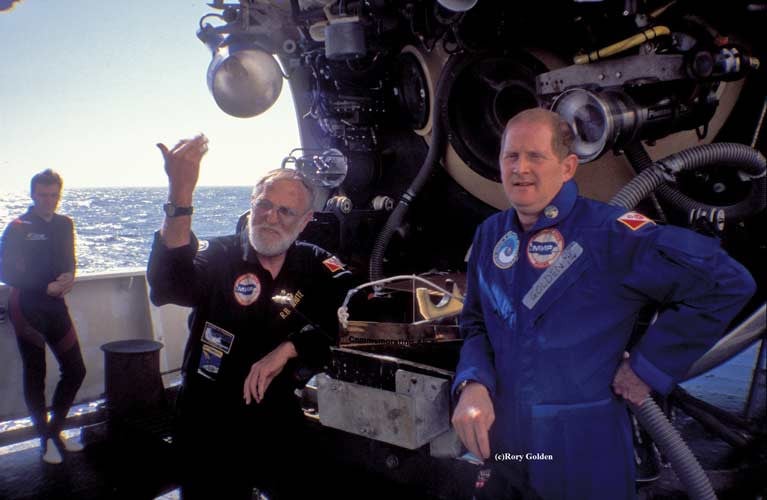Irish deep-sea diver Rory Golden is providing expertise to a new expedition to the Titanic which aims to recover the Marconi radio from the wreck, The Sunday Times reports.
The wireless Marconi telegraph was instrumental in saving more than 705 passengers from freezing Atlantic waters when the ship sank after striking an iceberg off Newfoundland in April 1912 with the loss of almost 1500 lives.
As Afloat reported previously, the ambitious project to retrieve the most famous marine radio in the world from 2.5 miles down in the Atlantic has finally secured legal approval.
The new expedition planned by RMS Titanic Inc, the salvor-in-possession, will be led by Dr David Gallo and French former naval officer Paul Henri Nargeolet.
Dublin-based Golden, who was the first Irish diver to visit the wreck site in almost 4,000 metres of water, has been engaged as a consultant to the company which has recovered over 5,500 artefacts in eight previous expeditions.
The former managing director of Virgin Records Ireland was dive safety operations manager for the Operation Titanic 2000 project which recovered 800 items - including the main ship’s wheel which he spotted. He returned in 2005 for a second dive, which was recorded in a BBC documentary.
In March 2013 he was a member of the team sponsored by Amazon.com founder Jeff Bezos which salvaged five Apollo F-1 rocket engines from 4200 metres in the North Atlantic, including one from Apollo 11 which launched a man to the moon in 1969.
Golden’s participation is one of several Irish connections to the new diving expedition which is expected to cost at least 10 million US dollars.
A Mayo community’s support for the new venture also helped to secure recently approved US Admiralty Court permission for it.
A letter to the US Admiralty Court from Addergoole Titanic Society director Toss Gibbons, secretary Mary Rowland and public relations officer Frank Gibbons urged that it would “give its blessing” to RMS Titanic Inc to undertake the expedition. The society remembers 11 of the ship’s fatalities from the Mayo village of Laherdane and surrounding area.
“We spent a lot of time in Ireland, in Belfast and with the folks in Addergoole to put a plan together which would satisfy the court,” RMS Titanic Inc president Bretton Hunchak said.
The recovery of the Marconi telegraph is crucial to understanding “the story of all of the survivors”, Hunchak explained.
 The Marconi Telegraph room as seen from the top of the Titanic Photo: Rory Golden
The Marconi Telegraph room as seen from the top of the Titanic Photo: Rory Golden
“Ultimately, the Marconi radio system remains an unsung hero, responsible for countless generations of families that exist only because the radio cried out on behalf of their ancestors,” he said.
“ For that reason, we must recover this incredible piece of history, to rescue the radio that saved 705 lives from being taken from the world that fateful night."
 The hatch to the Marconi Room Photo: Rory Golden
The hatch to the Marconi Room Photo: Rory Golden
Hunchak said the original plan for the expedition was within a weather window between June and August of this year, and that might still take place.
“Obviously, with the Covid-19 pandemic, we have questions now and will make a decision on timing very shortly,” he said.
“The Marconi telegraph is recognisable, from our underwater photography, but if we recover it there will be considerable conservation required before we can take it around the world as part of our exhibition of artefacts,” he said.
Golden said the project was “fraught with a lot of unknown and known variables, such as the condition of the roof area, the wreck itself, currents, visibility” and other factors, but has “a very good chance of succeeding”.
The wreck of the Titanic was discovered by Dr Robert Ballard and Jean Louis Michel in a joint US/ French expedition on September 1st, 1985, some 963 miles northeast of New York and 453 miles southeast of the Newfoundland coastline.
More on the Sunday Times report here































































